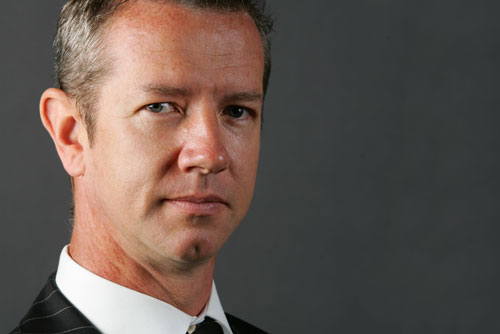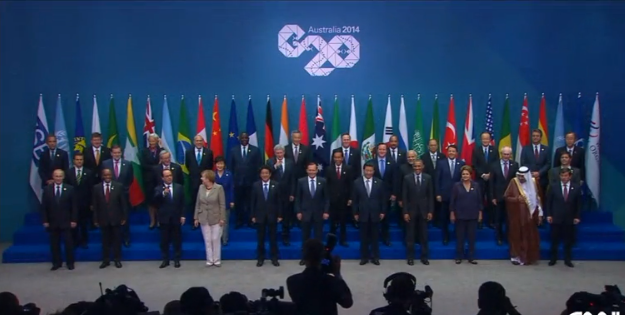As someone who is always in the market for irony, I’ll admit to having felt slightly giddy when I first read that the Abbott government had utilised Australia’s seat on the UN Security Council to formulate a recovery mission to Ukraine in the wake of the MH17 disaster. After all, it was Tony Abbott who, six months in to his stint as opposition leader, described Kevin Rudd’s bid for a seat on the Council (costed at around $13 million) as a vanity project and a waste of money. (That was in mid 2010, at which point Abbott was getting into character as his alter ego ‘Dr No’.)
That he would utilise the seat in such a statesmanlike manner was thus a rather neat reversal. A shame he had to spoil the effect by threatening to ‘shirtfront’ the Russian President. But hey, you can’t have everything.
Now, however, we are invited to regard this rather marginal irony as evidence of a more general and impressive one, whereby Abbott has attained to political maturity in the very arena – foreign policy – of which he was so dismissive in the past. Declaring Foreign Minister Julie Bishop to be the Coalition’s ‘star performer’, some members of the commentariat have decided that the government’s main achievement so far has been to move our brave young country a little closer to the centre of the world stage.
As his domestic agenda sputters and stalls in the face of a litter of recalcitrant PUPs, Abbott has discovered in foreign policy an outlet for the ‘grown-up government’ he promised in the 2013 election. The onetime isolationist is now an international player.
Hitherto, this narrative has appeared in rather piecemeal fashion – as a column in the Murdoch press or a comment on the ABC. But now we have its crystallisation in the form of a pamphlet by Peter Hartcher, the International Editor of the Sydney Morning Herald and a visiting fellow at the Lowy Institute. It is called The Adolescent Country, weighs in at a modest 128 pages, and is, in my view, a peculiar meld of the obvious and the obviously untrue. Nevertheless, its author’s credentials – and the fact that his thesis appears to chime with a more general feeling among the political class – oblige us to take it seriously.
That thesis can be simply stated. Isolationist Abbott is the authentic voice of Australian foreign policy, which suffers, and has always suffered, from what Hartcher calls a “parochial reflex”. This reflex ensures that foreign policy issues are nearly always subordinate to domestic ones – a reality of which the traditional carping about PMs who spend too much time abroad (remember Kevin 747?) is taken to be representative. So too is the lack of gravitas on the part of certain foreign ministers.

Hartcher tells the story of how Alexander Downer once yelled ‘Loser!’ at a political rival in Melbourne Airport, and has some stiff things to say about Bob Carr’s ‘buffoonery’. In short, Australian politicians regard foreign affairs as being of secondary importance and even, in extreme cases, as something of a joke. Having overcome ‘the tyranny of distance’ in many and multifarious ways, we nevertheless remain convinced of our marginal status in foreign affairs, and our behaviour and priorities reflect this fact. As a result, writes Hartcher, “International policy is used for domestic point-scoring”.
However, there are pollies who buck this trend. Gough Whitlam’s decision to go to China after becoming opposition leader; Hawke/Keating’s reorientation of Australia towards Asia and away from the West; John Howard’s commitment of troops to East Timor; Kevin Rudd’s key role in framing a response to the 2008 financial crisis: all of these are instances of where Australia’s leaders and would-be leaders have put aside narrow political concerns and acted in the national interest, which happened to lay in the international arena.
According to Hartcher, the current PM, in responding so ably to the twin disasters of MH370 and MH17, offering military assistance in the fight against Islamic State, and pushing hard on trade deals long in the making, is now knocking on the door of this exclusive club. As he puts it, “Abbott’s supposed weakness in foreign affairs has turned out to be his greatest political strength”.
How to weigh these observations? The first thing to say is that the ‘parochial reflex’ is certainly not peculiar to Australia. It is a commonplace of politics and history that domestic concerns will often trump, and even determine, foreign ones.
There is a whole literature dedicated to ‘diversionary foreign policy’ and one cannot think seriously about a range of conflicts – the US invasion of Grenada, the Falklands War, the bombing of the Al-Shifa plant in Sudan – without taking it into consideration. Shakespeare put his inky finger on the point. ‘Therefore, my Harry,’ Henry IV tells Prince Hal,
"Be it thy course to busy giddy minds / With foreign quarrels; that action, hence borne out, / May waste the memory of former days."
Clearly, the idea of the domestically expedient foreign policy didn’t come in with Wag the Dog.
Let us grant, however, that Hartcher is right to identify Australia as especially prone to parochialism and prone to it in an especially passive way. What, then, of his thoughts on Internationalist Abbott? Does his aggressiveness in pursuit of certain trade deals (Australia, remember, is now ‘open for business’), his offer of military assistance to the US and his manoeuvrings on the UN Security Council really amount to a Prince Hal-like conversion from political vandal to responsible statesman?
That he has come a long way cannot be denied. However, he was starting from a long way back – and for that he has only himself to blame. As Hartcher notes, Abbott’s opposition to the bid for a seat on the UN Security Council was an act of supreme political pettiness.
As a country that often commits troops under UN mandates, it is only natural that Australia should want to have a say in how those mandates are formulated. Abbott’s casual dismissal of that point, or his failure to see it, was a profound indictment. Praising him for having ‘matured’ in this regard is like praising a drunk driver for sobering up.
Nor, I think, can we be confident that Abbott’s vulgar isolationism has ceased to inform his foreign policy and, by extension, his domestic agenda.
His commitment of Australian troops to help in the fight against Islamic State was sold to the Australian electorate as necessary for Australia’s internal security (a ludicrous proposition, surely, whether one is supportive of that deployment or not), while his foot-dragging on the Ebola pandemic was spun as a concern for public safety (all this against the background, remember, of swingeing cuts to foreign aid).
Moreover, his fondness for martial language – ‘Operation Sovereign Borders’ and ‘Operation Bring Them Home’ are rather undermined by references to ‘Operation Repair the Budget’ – is revealing of a determination to blend the domestic and foreign policy registers in a deeply cynical (and ‘adolescent’?) way. Add in Abbott’s ‘shirtfront’ comment, his refusal to apologise to Indonesia over Edward Snowden’s wiretapping revelations, his puerile references to Team Australia (a term of both inclusion and exclusion) and his decision to preface a meeting of major world leaders at the G20 summit with a whinge about his budget woes, and a picture begins to emerge of a man whose most strenuous diplomacy is with his own electorate.

Clearly, many of these political themes were in place before the last election. Operation Sovereign Borders brought together martial posturing with a cynical appeal to xenophobia, and the Government’s ruthless implementation of the policy is viewed by the UN, and by many others besides, as a stain on Australia’s reputation as a ‘good international citizen’.
Meanwhile, its campaign against the carbon tax lives on in a generalised apathy about the issue of climate change per se. This September, the PM declined to attend an international conference on the issue – one hosted by UN Secretary General Ban Ki-moon – sending his Foreign Minister instead.
When asked if this suggested that Australia lagged behind the rest of the world on what is widely considered to be the biggest issue currently facing humankind, Julie Bishop replied that it was for Australians to judge. I submit that this is not the response of a government that sees its legacy as bound up with its standing abroad.
Towards the end of The Adolescent Country, Hartcher quotes an Essential Media poll to the effect that Australians have indeed adjudged the Coalition’s foreign policy to be a success. Unfortunately for his thesis, he also states – much earlier in the book, it is true – that good foreign policy tends to go unnoticed. Well, you can’t have it both ways. Either Abbott is a foreign policy lightweight who’s won kudos from the electorate for his posturing, or he’s a foreign policy heavyweight in the making and the electorate, as represented by EM’s sample, is uncommonly sophisticated for having recognised the fact. I know which version I believe. Then again, I suppose it’s possible that I just lack a "basic affection for the home team".
Donate To New Matilda
New Matilda is a small, independent media outlet. We survive through reader contributions, and never losing a lawsuit. If you got something from this article, giving something back helps us to continue speaking truth to power. Every little bit counts.



